#escalation
Explore tagged Tumblr posts
Text
escalation (Elrond x reader)
You gently knocked on the door to lord Ellrond’s study before entering. “I got the things you needed…” you said in a soft voice, not wanting to disturb him if he was doing something important.
“Thank you, y/n…” he said, not even looking up from what he was doing.
You set the things down on the extra chair in his study and turned to leave before pausing in the doorway. “Would you like me to bring you anything else? Tea perhaps?”
Elrond nodded. “Tea would be wonderful…” he mumbled.
You nodded and quietly left, heading to get him that tea. He’d more than earned it. You wandered down the hall and into the kitchen.
You returned and quietly entered, setting the tea on the table as Elrond grabbed a few books off the shelf, one falling in the process. You heard him sigh, clearly exhausted. “Ill get it.” you said, bending down and picking up the book that had fallen, offering to take the other books as well.
Elrond let you take the books and you set them down before turning and looking up at him. He looked exhausted. You slowly walked over and debated upon your next move before slowly putting your arms around his middle, providing him plenty of time to reject the hug. When he didn't you let your head fall on his chest. “Long day?”
He hummed in response before letting his arms wrap around you. He slowly went to press his lips on your forehead.
“Is there anything I can help with?” you asked, looking up at him. As you looked up, his lips met yours, causing you to turn red.
Elrond was just about to pull away when your hands flew around his neck, pulling him close to deepen the kiss, letting your lips lock with his.
Elrond pulled your body closer, his chest pressing on yours. Finally, he pulled back, needing to breathe.
Your cheeks were dusted over with pink and you smiled, looking up at him with a spark in your eyes. “Well, that's not how i imagined my first kiss but i must say, i'm not disappointed.” you let your body fall into his and he smiled softly, pulling you in for another kiss.
Your fingers found his hair, getting tangled in the silky brown strands. He took slow steps back, searching for the armchair. When he found it he sat, pulling you onto his lap and continuing the kiss, clearly longing for you above his work…
#kat651#x reader#lord of the rings#lotr#cute#elrond#lord elrond#lord elrond x reader#elrond x reader#elrond x you#Escalation
197 notes
·
View notes
Text







Repost from @fundsforgaza:
This holiday season, join the collective effort for a Consumer Strike for Palestine to call for a permanent ceasefire in Palestine and an arms embargo on Israel: commit to BDS, avoid non-essential spending and donate the money you save to Gaza 🙏🏻
🇺🇸 U.S. people: Learn more about @consumerstrike4palestine and sign up at 🔗 consumerstrike4palestine.org.
Then tell us in the comments ⬇️ what level you’ve committed to & tag up to 5 friends you want to join you!
🌍 Outside the U.S? Follow @in.war.ds and learn about other initiatives you can join at 🔗globaescalation.com.
And wherever you are in the world 🇵🇸 find @fundsforgaza's current fundraisers and donate to Gazans at 🔗linktr.ee/fundsforgaza.
#palestine#human rights#free palestine#gaza#free gaza#gaza genocide#israel#boycott israel#boycott divestment sanctions#black friday#mutual aid#gaza mutual aid#consumerism#capitalism#anti capitalist#arms embargo now#stop the genocide#escalation#global strike#strike for palestine#strike#Gaza fundraisers#gaza gofundme
38 notes
·
View notes
Text
Escalation
Sam called to Dean from the bathroom, "Does this look like mold to you?"
Dean was busy with his duffel. “Who cares?”
“I care, Dean. I don’t want to get a foot fungus.”
Dean laughed. “Remember when you got that toenail crud that made your shoes smell like cheese?”
Sam glared at him. “Yes, I do. I do remember that.”
“Fine, I’ll look. But I don’t know what I can do about it.” Dean bent over and looked at the shower floor. “Where?”
Dean realized too late—he started to straighten, but Sam was already behind him. When Sam slapped his ass—hard—Dean had to grab the shower door to stop from falling forward.
Sam cackled. “You’re such a sucker! That’s four vs. two. You’re falling behind, jerk.”
“Shut up, bitch.” Dean rubbed his butt cheek and wondered how the latest prank war had become an ass-slapping contest. Whatever. It was just what brothers did.
He had an idea for his revenge, though. He’d see how Sam liked having his ass slapped in the shower—without the benefit of clothing to soften the blow. That’d show him. Yup. It was just what brothers did…
48 notes
·
View notes
Text









37 notes
·
View notes
Text

#iran#israel#escalation#hamas#hezbollah houthis#iranian aggression#iran calls for the destruction of israel
27 notes
·
View notes
Text
Destinytober Day 13: "Escalation"
It was all fun and games, until...

#destiny 2#destiny the game#my art#fanart#uldren sov#Cayde-6#sundance#ghost sundance#Forsaken#Destinytober#Destinytober23#day 13#Escalation
87 notes
·
View notes
Text
When you try fearmongering about "escalation" in Ukraine but you don't even know how many World Wars we've had:

#useful idiots#emphasis on idiots#they're so fucking stupid i swear#probably a us republican#fearmongering#escalation#russian war on ukraine#russian propaganda#russian invasion of ukraine#blocklist material#bad history#us centrism#lmao
10 notes
·
View notes
Text
Got up to twenty in escalation last night, and am dying of exhaustion lmFAO.
Gonna try for 30 today
#outlast#outlast trials#red barrels#the outlast trials#reagent#prime asset#leland coyle#escalation#video games#send help
10 notes
·
View notes
Text
The Machine Breaks

#halo#halo infinite#blender#3d#3d art#blender 3d#halo art#blender3d#Promethean#Promethean knight#sangheili#elite#zealot#elite zealot#sangheili zealot#halo escalation#the machine breaks#escalation#halo 5#halo 5 guardians#arsin art#halo spotlight
11 notes
·
View notes
Note
Also the whole "flooding the world thing" - I think its a copout too for Oda to remove any complexity - now even some badguys must simply fight for the good side, cause yeah, nobody wants to drown.
There isn't any ambiguity over marines, like "the goverment may be bad, but it atleast stops anarchy from taking over" - no, now the goverment literally wants to destroy the world, so even Black Beard is the lesser evil, cause supposedly he just wants to rule it not destroy it in a black hole, but maybe thats gonna get revealed too lol.
I actually disagree with this, because this has been foreshadowed for a long time, and the set up for a massive escalation has been building up as the series and our understanding of the World's history has been revealed... But there was definitly a massive change at some pount, am im pretty sure I can pin point what it was.
But to set the stage...
There is one, single canon One Piece Movie. Strong World, written by Oda as Luffy's final adventure before everything went down at sabaody, amazon lily, impel Down, and Marineford.
But there was going to be a second canon movie.
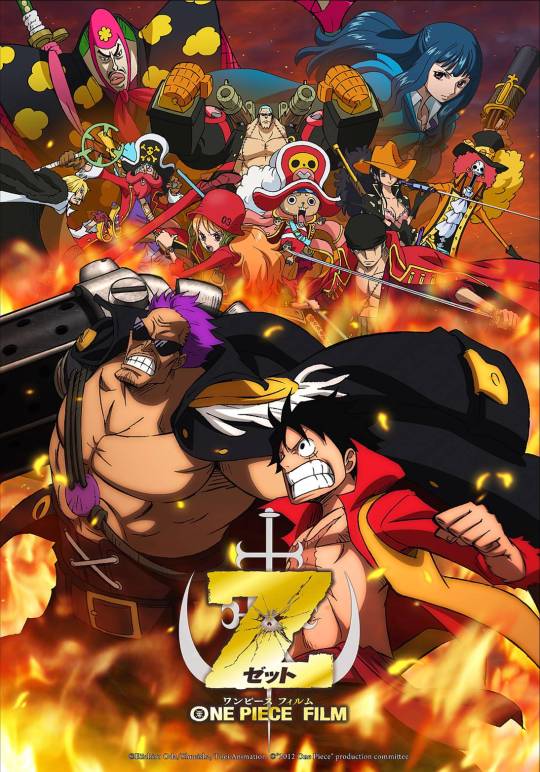
One Piece Film Z was made with the idea of it being canon from day one in mind... Only for Oda to realize there was so many continuity mistakes within the movie in relation to the film, that he wqs forced to scrap it as being in continuity with the manga.
However, the important thing is not that it wqs scrapped as canon, but what Oda wrote as it's plot and how it relates to Imu's eventual plan.

The plot of Z, is that the former Marine Admiral Z is planning on ending the Golden Age of Piracy...

By using a super weapon called the Dyna stones to cause a volcanic chain reaction that would lay the New world beneath the waves(Something that an eagle eyed viewer might realize means all the islands in the new world is part of one, continious chain of tectonic activity, suggesting it was all one continent).
Sound familiar? That's right, this was Oda foreshadowing the eventual big endgame of the series by showing a villain plan something similar, just on a smaller scale.
Also, It's not really focused on before the very end, because this is very much a movie about the Straw-Hats vs Z, but the marines are NOT onboard with this plan at all, even if they would wipe out Kaido, Big Mom, Shanks and Blackbeard by doing it.
The reward is not worth the cost.
Again, Oda puts the reality that for how bad the marines can and are through the series, there are moral lines that even they, even Akainu himself wont cross.
I have a lot of critiques of Oda as a writer, but one thing I cannot complain is just how thouroughly he plans things out and hints at events to come. How well he does that as a norm, just makes the times when he fails look so much more jarring by comparison.
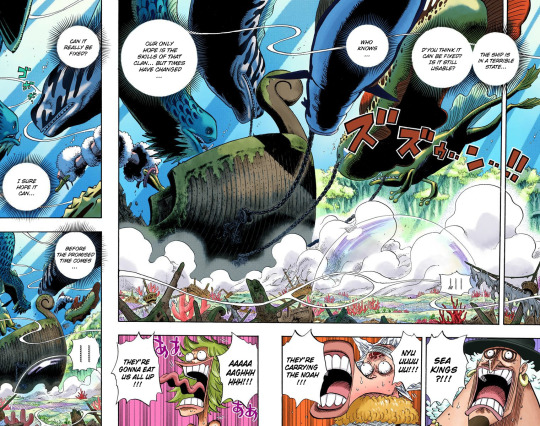
Then of course there is Noah. The giant, giant Ship that was the big unfired chekov's gun from Fiahman isles, made as a response to the reality that the side of the great Kingdom had lost the war, and now had to prepare for the contigency plan.
We have no idea what Joyboy's original plan was, or what he wrote on that apology to his friend/lover/ally Poseidon, but she and her people presumably built this ship as a result, and the reason for it was that Joy Boy and his side must have feared that the endpoint of everything was that the entire world would end up being flooded as a result of them losing the war.

Similarily, Wano, the only other country that we know fought on the side of Joy Boy and his allies, erected enormous walls around itself, which charqcters in story thinks are for defence, but when you have the full picture, it's obvious these were made in preparation of what they must havr thought would be coming soon, a total sinking of the entire world.
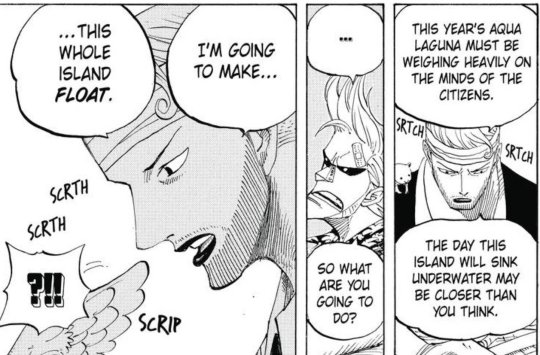
Another Chekov's gun that is as of yet unfired is Iceburg's plan to turn Water Seven into a floating Island. Ehich was treated as an interesting solution to a problem at hand, but when you realize where this story would ultimately end up heading, it's actual endgame purpose becomes clear, as one of the island's that are going to survive the comi g sinking, just so happens to be the same one where Pluton was originally built.
Just in time for the Thousand Sunny to fullfill it's purpose of reaching Laugh Tale and the Straw-Hats needing to level the playing field for Blackbeard's coming aquisition of Pluton.
Now with all of this in mind, it's pretty clear that Oda has been planning this endgame for a very, very long time.
So with that in mind, what was the shift i was talking about at the start?
Well, from a story perspective, the eventual flooding of the world was always One Piece's endgame.
But from an in universe perspective, i dont believe at all, that this was what Imu and the Gorosei was going to be about all along.
Rather what i think was the original plan, was that though Joy Boy somehow foresaw this as the future that would take place when he was "Reborn", what actually was going to be the case, was that the plan to just sink the world and be done with it was going to be the result of massive escalation from the World Government's perspective.
From a historical perspective, Imu has been the unchallenged leader of the world for a long, long time.
During that time, there was very little need, or motivation for Mariejois to flood the world... Why would they even consider such a course of action?
Well, if you pay attention to how we were introduced to these concepts back in Water Seven and Enies Lobby, there starts to form a picture.
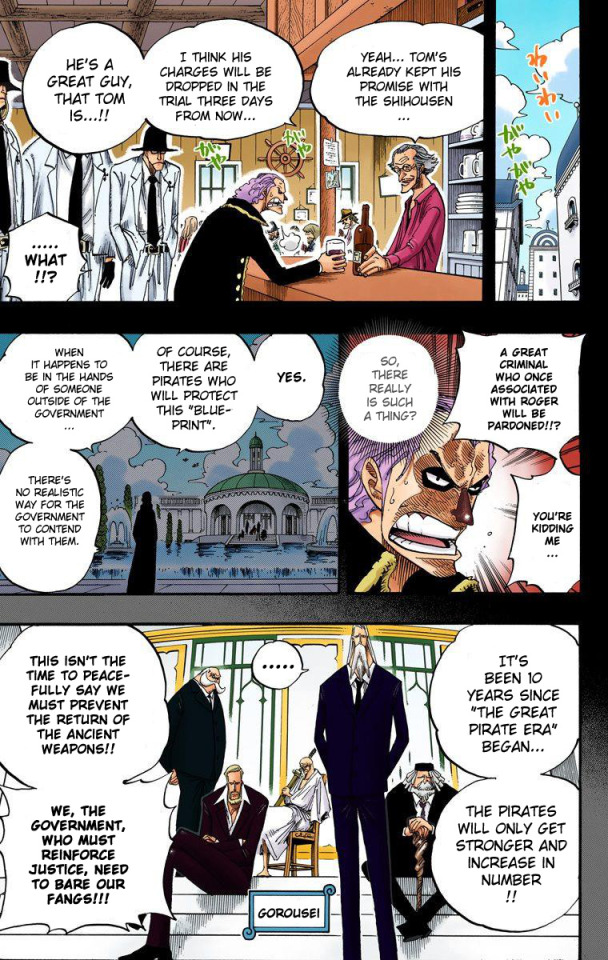
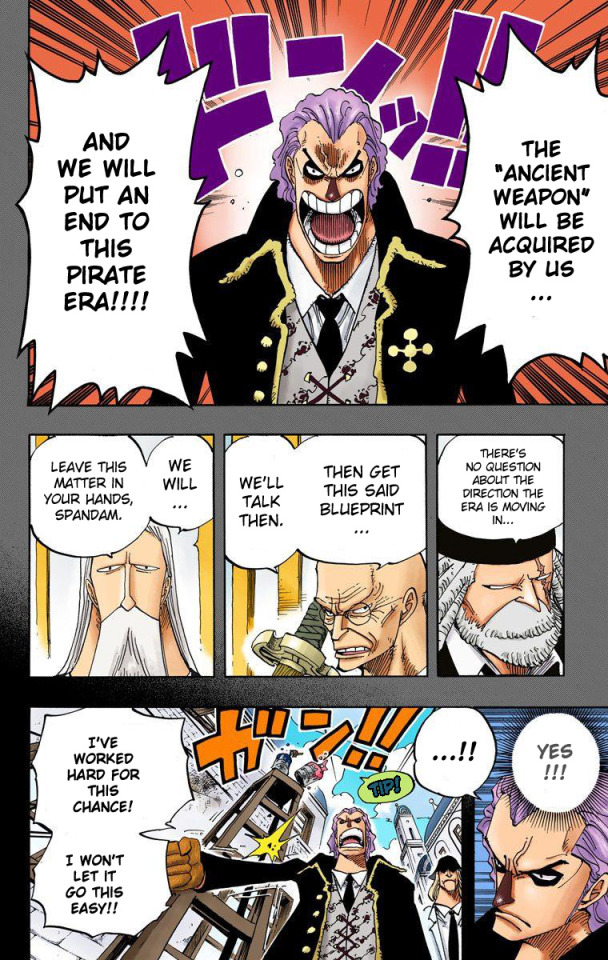
Originally the stance of the WG going to any and all lengths to keep the very existence of the void century and the ancient weapons a secret was ironclad.
It was the way of things for centuries.
But then something happened. Something so monumental that they changed from trying to keep them buried, to try to revive them and harness their power for their own ends.
That something was 2. Things.
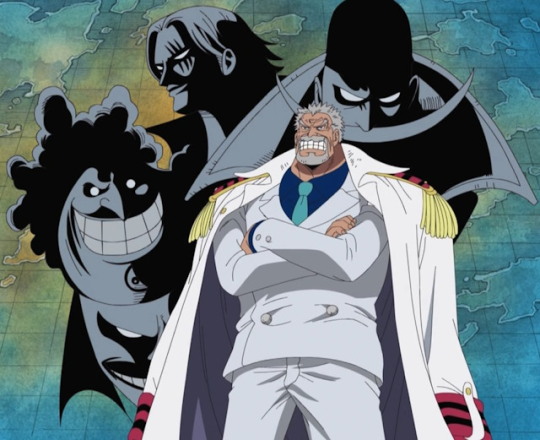
The great Pirate Era, and rise of the Yonko.
The greatest and most dangerous Pirate in history(So far) was Rocks, a man who tried to upend the entire world order, but at the end of the day, after his death his entire crew fell apart, and his ambitions and legacy died with him.
What really changed, was Roger, and the 4 Pirates who followed after him as the rulers of the next age.
Roger lit the world aflame in the great Golden Age of Piracy, and over the course of two decades, the World Govenrment's grip over the world began to disintegrate in the face of the rise of countless new pirates who took to the seas.
And of course, there was the other problem. The Yonko.
This is a fact that the Five Elder's immortality makes somewhat easy to miss, but not a single one of them, nor the Admirals, are on the same level of power as the Yonko.
Other than the Boar one, Luffy has so far beaten around the Gorosei lime ragdolls with little difficulty, and as we saw with both Luffy's manhandling of Kizaru, and a heavily wounded witebeard, who's age and illness made him unable to use his Haki to it's fullest potential still taking down Akainu in two hits, the Yonko are at a level of Pkwer that the World Government simply has nothing to bring to bear to realistically challenge them.
One, single exception might be Imu, as we don't have a good idea of how powerful the Monarch actually is, but Imu's capacity to actually be able to go out into the world is rather limited given how important total silence is on the very existence of such a figure.
And worse, while Rocks was a figure who's existence could be covered up, the Yonko weren't just pirates. They set themselves up as monarchs of their own, the inheritors of Roger as the rulers of the seas.
So influential was they they the world government couldn't directly challenge them, they couldn't wipe the knowledge of them from history, and they in general just had to tolerate their prescence and the risk that any one of them might go to Laugh Tale and find Roger's treasure.
So with that in mind, they tried(and eventually succeeded to some degree) to ressurect the ancient great weapons of old, to do with the great powers that brought ruin to the world, what their military power could not.
With this in mind, the logical conclusion is to assume that the plan to just sink the world beneath the seas would just be the next escalation.

That something being Luffy's awakening his devil fruit, The Ancient enemy of Poseidon coming back into the picture, and... Blackbeard.
I honestly dont know why he's so important in this situation(It would make way more sense if this happened AFTER he obtained Pluton), but im guessing that the fact he possesses the devil fruit the world government has labled as continuing the power of the Devil Himself has something to do with it.
So with this in mind, it makes way more sense that the final endgame of just "Flood everything and let god sort them out" was originally planned to be a direct escalation of the rising challenges Imu faces.
Just wipe the board clean, rather than risking the pieces doing to us what we did to the great kingdom.
Im honestly not sure WHY it changed to "This was always the plan.", but if i had to guess, Oda's original plan for this was that it was going to be Luffy's awakening that would serve as the final straw figuratively speaking, where Imu would finally reveal themselves and declare that play time was, figuratively over.
However if that was the chain of events, then Luffy's rise to Yonko would be an unambigiously bad thing, that would color the entire end of Wano in a rather grim light.
Rather than a hopefull beginning, it would instead be the final hours of the old age, before the events that took place there brought about the apokolypse.
There would be no way to spin that as a good ending in any way... And if there is anything that marrs Oda's writing more than anything else, it's his horrific fear of letting a story or arc end on a full on downer ending(The only exception to that ever being Marineford).
#one piece#meta#imu#world government#monkey d luffy#ancient weapons#questions and answers#escalation#film z
11 notes
·
View notes
Text

The dull sound of war planes overhead Can be heard all night and all day Here, not far from the border.
But the people on this side of the fence Don’t notice it much any more.
Only when there's a warning of rocket attack
And the windows start rattling And the air sirens piercing shrieks Call everybody to hide:
The neighbors hurry to the bomb shelter Meeting twice a day to complain How inconvenient this war is.
Only me, a foreigner, can’t stop hearing The cries these planes are bringing To the children on the other side of the border
30 kilometers away.
© November, 24, 2024
#Poetry#lebanon war#hezbollah#invasion#israel lebanon conflict#israel lebanon war#aerial bombing#2024 war#escalation#crimes against humanity#crimes against children#israeli hamas war#gaza#air raid#bomb shelter#southern lebanon#beirut#missile strike#my poems#original poems#free verse#poetblr#trauma#displacement#Dahiya doctrine
2 notes
·
View notes
Text
Cruelty is an Unreliable Weapon
The internet has been irritating me of late. This is in some sense, nothing new, but it has been irritating me very specifically in what I view as extremely wrongheaded thinking about the absence of any presence for morality in conflict. You can read between the lines if you so choose to infer what I'm discussing obliquely, but if you'd prefer, assume this is about people who are constantly whining that the Federation isn't tough or militaristic enough, or Galactic Empire apologists.
Settle in, get a beverage, because I got a bit wound up. This will take more than a minute. It clocked in at about 8 pages & 3600 words in Google docs.
Theories of Power and Victory
Two contentions are often made in discussions of war and conflict:
That the capacity to resist equals bargaining power without taking into consideration the manner of resistance i.e. committing atrocities.
The second is that suffering hastens the end of conflict.
Let's examine this. I’m going to primarily lean on case studies from World War 1 because they allow me to speak about modern conflicts via allegory. Allegory by necessity obfuscates the real message the reader is expected to take away from this.
I am at peace with this. If I tell you what to think about the conflict between the United Federation of Dave Filoni Truthers and the Galactic Republic of Rian Johnson Apologists, you will be more inclined to be combative.
If I engage in a bit of obfuscation, then you’ll be more inclined to take these case studies as they are intended. These are thought experiments and frameworks. My hope is you use them to think through modern conflicts where you may be more inclined to fully dehumanize the evildoer or wave off complaints about the behavior of the righteous as “regrettable but necessary.”
Loosening Rules of Engagement: Almost Always a Bad Idea
In World War 1, there was a continual escalation as all sides sought new innovations to break the deadlock. This took the form of both new weapon systems but also new strategies.
Technically commerce raiding is arguably as old as the idea of putting trade goods on a boat, but the usage of submarines definitely represents an escalation and innovation on that idea. In theory we were beyond the days of letters of marque. Assaulting civilian shipping would be considered atrocious and ungentlemanly in normal times.
However, in an era of total national mobilization, it is the very foundations of the nation that are supposedly necessary to be chipped away at in order to try to obtain the defeat of the enemy. In the arguments made under conditions of total war, there may be non-combatants but there are no persons who are truly uninvolved because in a total mobilization, everyone is contributing to the war effort whether with their sweat or their blood.
Even children, especially in the late Victorian era, are net contributors because they take on responsibilities formerly held by adults and, if the struggle is prolonged, will grow into adults who can be drafted or more fully contribute to the industrial effort.
Yet the enemy doesn’t stop thinking of their children as children. The enemy doesn’t stop thinking of their non-combatants as civilians, even as the enemy rationalizes their way into killing the children and non-combatants of their opponents.
So what happens when Germany expands its commerce raiding to include civilian liners suspected of carrying arms ought to be very predictable. The story of the US entry into WW1, if it's told at all - and that’s another bag of badgers - often centers on the sinking of the passenger liner Lusitania.
Arguably the sinking of the Lusitania does hasten the end of the war, but not even remotely in the way that Germany anticipated and definitely not in its favor. It's important to note that the story is not so neat and tidy. The Lusitania is often held up as an inciting event, but the US doesn’t enter the war for another two years when Germany resumes unrestricted submarine warfare.
Rather than say “my bad, you’re right, we shouldn’t have tried to play silly games with sending weapons on passenger liners” the US entered the war in an official capacity. The US entry into the war wasn't decisive right away, it was arguably even more bumbling and horrific as the first year of the Russian invasion of Ukraine, but it makes the endgame that much more inevitable for the Central Powers.
Don’t blur the lines between military and civilian.
Germany essentially walked into the trap that Britain baited with international civilians. There are no objectively correct moral actors in this situation but we can certainly dissect the consequences, especially for Germany, of having elected to not take the high road.
When it comes to the US entrance into the war, this story is complicated by the fact that there was a strong contingent of Manifest Destiny true believers who didn’t look at the Western front and feel appalled at how far honor, nationalism, hate, and sunk cost would drive people. Rather instead they saw an opportunity for the US to take her rightful place as a key player in The Great Game.
So it's easy to argue that absent the sinking of the Lusitania, the US would have been dragged in anyway. It was, after all, the biggest creditor of the Entente and were Britain, France and friends to lose, it's quite likely that repaying the Americans would come second to compensating the Central Powers for the inconvenience of having to send millions of people into what amounts to a wood chipper.
However, the sinking of the Lusitania definitely moved up the timeline of the US entry into the war. A thing that could have been delayed, and perhaps even prevented if one or more Black Swans had scrambled US domestic politics. Because the Germans failed to practice a stricter set of rules of engagement, a new player takes the field, the US is able to arm Britain and France more prolifically and openly, and Germany’s goose is pretty well cooked. The only question being how long it was going to take to cook that goose.
While there was certainly malice, pride, and national chauvinism involved in creating conditions in which Germany would be tempted to escalate by striking ships with Americans onboard, there’s no ironclad law of physics or human behavior that dictates the US was going to enter the war.
Had the United States wanted to stay out of the war it could have made a range of different choices, some of which arguably were against the prevailing understanding of its “national interest” and some could be read as rewarding German threats of “terrorism” against civilians, but “bad” options are still options:
Forbid mixed use Entente ships from using US ports.
Forbid American passengers from booking passage on Entente ships carrying weapons.
Warn Americans that their personal security is their responsibility and if they do enter contested waters on a ship that might be considered a legitimate target, they’re on their own.
The British own part of this too: it was their choice to comingle arms shipments and civilian passengers.
It goes without saying that the Germans also weren’t obligated to sink Lusitania.
Of course this choice is complicated by a whole host of contextual factors: British ships had been instructed to try to ram German submarines instead of submitting to boarding and inspection, and some British civilian ships had been armed.
Allowing Lusitania to go along her way peacefully also rewards the British for using human shields.
I don’t find the Germans morally praiseworthy here, but the British deserve heaps of scorn for intentionally putting civilians in danger in order to prioritize winning a war that was anything but existential for it and then daring the Germans to kill civilians to disrupt the British war effort.
What happens if the Germans don’t take the bait? Well, the war definitely goes on and is that much harder for the Germans but they retain a measure of the moral high ground.
Could this win them useful allies in the court of global public opinion?
Or at least keep certain disruptive players like the US out of the war?
The US was the last great power to not take a side as of when Germany and the UK began their nautical shenanigans with tragic consequences. It's doubtful the US could be compelled to enter the war on the side of Germany, hence why Germany could have understood its situation as necessitating unrestricted warfare against not merely the Entente militaries but the Entente people themselves.
However, again there is nothing inevitable here. There are a lot of reasons why the US staying out of the war was unlikely, but it's far from impossible - I don’t believe in historical inevitability, just higher or lower probability.
Because of this lack of inevitability, it is worth restating the moral proposition Britain cast aside:
Don’t comingle military and civilian.
You ignore this advice at your own peril. The consequences are entirely predictable.
The US may very well have not come charging in to bail out the Entente. It could have sat on the sidelines and cut support for the Entente to punish the UK for putting foreign civilians at risk. I think it would have been VERY morally defensible to do so.
There are scenarios, such as insurgency, where the camouflage of being civilian in appearance is necessary if armed struggle is to be at all viable, but again the consequences for “real” civilians are very predictable.
That doesn’t mean the party that winds up killing civilians, intentionally or unintentionally, is morally blameless: it's a choice to loosen rules of engagement or to not exercise even greater care when dealing with ambiguity. There is no mandate to kill civilians through recklessness, indifference, cruelty, or to deny the enemy an advantage.
Everything is a choice.
Immoral choices are rarely unavoidable. Accidents truly happen and are tragic, but caution isn’t a frivolous thing to be cast aside for convenience or galaxy brained theories about psychological warfare as Germany’s fate demonstrates.
Yet, to beat a dead horse, to say that those who blur the lines between combatant and noncombatant have no responsibility for what happens to noncombatants is also deeply disingenuous.
Suffering is an Inconsistent Weapon at Best.
There’s a deeply felt conviction among some that hardness wins wars faster. As near as I can tell the premise usually comes from one of two sentiments.
The first is that the enemy, being a rational actor, is capable of “doing the math.” Once they understand what the aggressor is willing to do to win. How far they’ll go, then every day that surrender is deferred is just more rapes, homes burned, prisoners tortured, more famine, more suffering: pick your poison. Therefore the reasonable and moral thing to do is to just get it over with.
The Romans are probably the most famous example of a people who practiced unmitigated savagery when a city didn’t surrender promptly in order to induce others to not resist in the expectation of gentler treatment. This is a practice that preceded the Romans and I’d argue that it's unlikely that there is any corner of the world where there was no close parallel at some point in time.
While we can’t know for certain until and unless Russian archives are made available at some point in the future, it's tempting to ponder whether or not this mindset has influenced Russian atrocities such as in Bucha. The Romans were also guilty of not always being able to prevent their legions from going berserk even when a city was compliant.
Inflicting cruelty to try to induce surrender is almost definitely one motive behind the targeting of Ukrainian civilian infrastructure, especially electrical equipment during winter time. Which informs us that this mindset does continue into the present day, just expressed in different forms and contexts.
The second assumption is that sufficiently intense or broadly inflicted suffering would shatter the will to resist on a psychological level: creating panic, terror, disorder etc. We see this in its most straightforward form on ancient battlefields when armies rout after an understanding filters through the ranks that things are starting to go pear-shaped.
Whether or not this model can apply to something on the scale of a region or a nation is disputed and the answer probably is more about worldviews than objectivity.
If panic on the scale of a nation is possible, then panic doesn’t always achieve the desired result.
One might argue for instance that Western and especially US Islamophobia drove the US and allies to make a series of unforced errors with a human cost in the millions and still counting as the ripple effects are still rippling even after all this time. Calm and collected people may have been drawing lines on maps and debating the “get in and get out” or “if you break it, you bought it” models of war, but in the background is a subtler, longer term, persistent panic and existential dread induced by 9/11.
Of course it could have just been some mix of racism and imperialism. If that were the case then ascribing fear to the motives of Bush, Cheney, and the alumni of The Project for a New American Century incorrectly offers the villains the opportunity to plea bargain the charges down from War and Failed Occupation in the 1st degree to War and Failed Occupation in the 2nd degree.
For whatever it's worth the excellent podcast series Slow Burn: The Road to the Iraq War persuaded me that the primary, conscious motive was rooted in a broken epistemology about how to combat terrorism, the threat posed by Iraq, American capacities, and further sabotaged by philosophical infighting over to what degree and how to nation build that manifested in real world consequences for how resources were allocated, rules of engagement written, and which personnel got key jobs.
Let's return to World War 1, because it has probably more than just the two illustrations that are relevant here but I’m just going to limit it to two.
However, it's worth revisiting poor but possibly perfidious Lusitania, whose souls aboard needlessly died because the Germans decided to be edgy and declare the waters around the UK to be a free fire zone. Then the UK responded with “I dare you to enforce that” and put arms on civilian liners anyway.
Harshness did not, in fact, have the desired outcome for Germany. It failed to deter Britain from using dual purpose shipping and then following through with their threats ultimately escalated the conflict. Ultimately it's unclear if Britain’s will to continue the fight was impeded in any way and the popular narrative is that it galvanized resistance.
Although information warfare may have played a role too: the British government denied any violation of any of its obligations under pre war treaties or any violation of general decency: i.e. putting civilians at risk without their knowing consent. Messaging and the possible absence of knowing consent on the part of civilians is also worth holding in our heads when weighing the morality of ensuring the homefront is made to feel pain too.
Bringing the War to the Homefront
The British blockade of Germany in World War 1 has two rationales. One is that in total war, as discussed previously the civilian population is playing a very active part in sustaining combat operations. Attritional war is an effort to ensure that your side is not the first to run out of people or stuff. The average person is a lot more aware of this due in no small part to the way the Russian invasion of Ukraine in its second year has calcified into heavily fortified battlelines with much, much less in the way of dramatic maneuvers than in 2022.
The introduction of various destabilizing weapon systems: Javelin, Excalibur rounds, HIMARS, Stormshadow etc. has at each step momentarily unsettled the balance of power but Russia continues to be able to field enough people and material to absorb the losses and then adapt while Ukraine is, unfortunately, reliant on the patronage of allies and what industrial capacity it can scrape together and protect from Russia: no small feat in an era of satellite surveillance, rampant hacking, and cruise missiles.
Notably Ukraine or Russian partisans acting on their own accord or with assistance, have struck at various bits of Russian infrastructure and industrial sites.
This has made some commentators uncomfortable whether because of natural anxiety at seeing the homefront of a nuclear power get hit or a certain amount of hesitancy to label these as legitimate targets. Something Russia is not even a little squeamish about, nor (more controversially) was the US squeamish about during the first Gulf War.
Saddam Hussein notably would continue to be the ruler of Iraq, even under sanctions and bombing campaigns of varying intensity until the US led invasion in 2003.
Which brings us to the second rationale for the British blockade of Germany: punishment with the expectation that it would eventually break the German people. This included food. While this didn’t completely cut off Germany from food imports, the necessity of neutral ships to be inspected and escorted to Germany at minimum had a chilling effect that clawed back 55% of imports of all types and cut the average German down to 1,000 calories a day by 1917.
That’s one large McDonalds meal per person per day and that’s about it. I once had a salad, A SALAD, from Applebees that wound up having over a thousand calories.
Now of course, the success or failure of the blockade is disputed by historians. I have a lot of respect for the profession, but it’s also not hard to imagine that there is some motivated reasoning involved.
When a nation does something that is controversial in its own time, as the blockade was, and winds up killing between 400,000 and 800,000 people through among the cruelest of means: famine, if it turns out that these actions didn’t directly contribute to ending the war sooner, the nation who inflicted this on their fellow human beings is not exactly the hero of the story now are they?
So of course the desire is going to be very strong to gesture at problems with disorder, looting, and the increasing poor health of the military and civilian labor force as having made strong contributions to ensuring the war didn’t last longer and claim even more lives.
On the other hand, average caloric intake fell to a Special Value Meal per day (and probably much worse if you look at essential vitamins and protein) and the Germans kept going for five years. It's possible that absent the blockade, the war lasts even longer but that’s a counterfactual we simply cannot realistically examine because life isn’t an Excel sheet.
Duration also doesn’t necessarily directly map to intensity. If the war is not perceived as an existential struggle because both sides are attempting to collapse one another’s very societies to set conditions for peace on their terms, how does this change the tactics used in the field and the overall strategy?
Because if there is one point I want to hammer home it's that the perception of a war as being existential is intensely radicalizing. People will endure suffering that is unimaginable to people sitting in comfort and safety if they are operating under the belief that if the war isn’t won, the nation and its people will experience even greater suffering than they are experiencing under conditions of war, or even that the nation may cease to exist, its people scattered or massacred.
It's even harder for us to imagine that concepts like the German or British Empires might be worth “going over the top” for, or sitting around never knowing if a poison gas attack is going to be launched in your sleep. Or more nightmarishly: that you might feel so deeply that the fate of your nation is at risk, that it might be worth executing your subordinates for cowardice if they don’t attack enemy fortifications.
Of course there is also the example of modern Ukraine. It is rather clear that the people of Ukraine have taken very seriously the statements of Russian high level people that “Ukrainian” is an invalid identity that must be made to be subsumed into the Russian identity. One does not have to be an ardent nationalist, and I am not, to find this to be more than a little concerning.
It's not hard to imagine that extremely bellicose rhetoric from an opponent, when combined with growing suffering on the homefront and no doubt plenty of propaganda proclaiming the enemy to have an exterminationist agenda, would radicalize even people who are ambivalent to their government.
In 2002, it was widely expected that mounting casualties and a worsening economic outlook due to the war in Ukraine would seal Vladimir Putin’s fate. At the close of 2003, with nearly two years of fighting and one half baked mutiny in the books, Putin remains and is seemingly even more secure in power.
This is a more problematic example because it's hard to conceive of any strategy Ukraine or its allies can undertake that would preserve Ukraine’s autonomy while not generating at least some evidence to support Putin’s “Big Lie” about Russia being a victim pursuing legitimate security interests. Yet, in spite of this, great effort appears to have made to avoid feeding that Big Lie unnecessarily.
As of this writing, Ukraine has not pursued targeting Russian civilians directly either as an explicit policy nor is there much if any evidence it is doing so implicitly. Some in the amateur punditry of the fever swamps of social media have proposed Ukraine pursue payback against Russia for Bucha and other atrocities, but I think history shows this would be deeply, deeply mistaken.
Intellectual honesty compels me to hold up this example: sometimes a nation (Russia) (or just its political elite) can be responsible for the vast majority of the suffering its people have experienced and yet this too can be contextualized to fit a narrative that casts a struggle as existential, centers the chief provocateur as victim, and some critical mass of people will go along with it, rather than reject it and collapse the war effort from within.
Notably, while World War 1 shattered the Russian Empire, the various transitional governments between the end of Czarist rule and the eventual takeover by the Bolsheviks did not exit the war.
Consider all of these case studies, all ye who would dismiss rules of engagement as unworthy of dishonorable foes or inefficient, and would dismiss concerns about excessive cruelty or collective punishment as soft and defeatist.
#War#rules of engagement#ethics#cruelty#the great war#lusitania#Triple Entente#Central Powers#world war 1#laws of war#atrocities#crimes against humanity#collective punishment#escalation#current events
12 notes
·
View notes
Text
Lore Thursday — Tyrant
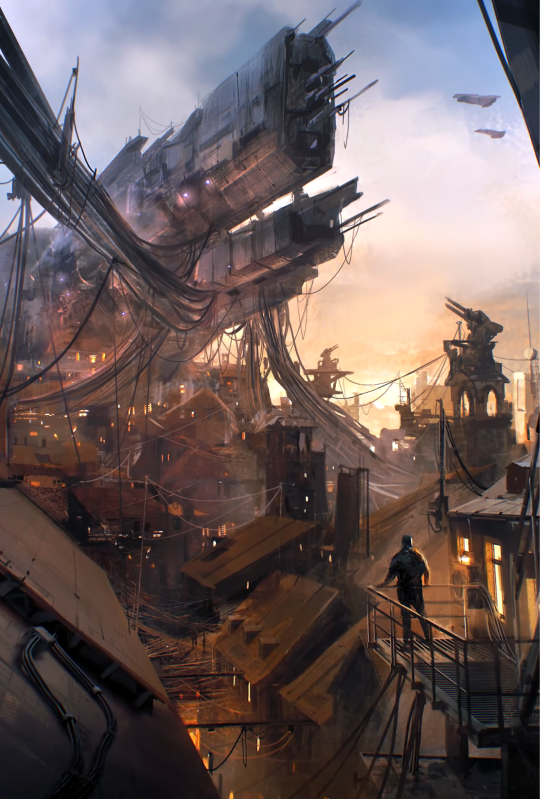
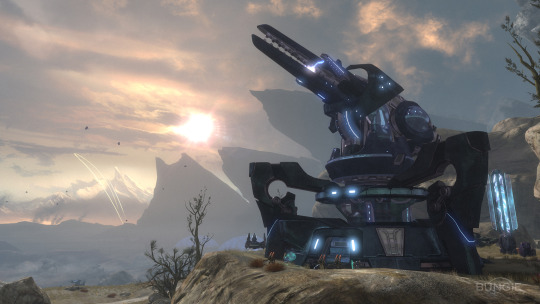

The Cheru-pattern Sky Striker, or Tyrant, is an anti-aircraft weapon emplacement capable of reaching orbiting starships. A Covenant design, Tyrants still see use after the war, even with human factions like the Venezian Militia.
#lore thursday#LoreThursday#halopedia#halowiki#halo wiki#halo#haloreach#halo reach#covenant#thecovenant#the covenant#artillery#halospartanstrike#halo spartan strike#reach#spartan strike#haloescalation#escalation#halo escalation#halospartanassault#halo spartan assault#spartanassault#spartan assault#spartanstrike#haloglasslands#halo glasslands#glasslands#Type-38 Anti-Aircraft Cannon#type-38 tyrant#tyrant
22 notes
·
View notes
Text
As you can see, the situation has escalated to a moderate breeze punctuated by some intense gusts and crashy waves. Still just a light drizzle tho. Wonder where it’ll all go from here?
2 notes
·
View notes
Text
by Jonathan S. Tobin
It was the covert operation that inspired thousands of Internet memes. The simultaneous explosion of thousands of pagers in the possession of Hezbollah operatives followed a day later by a similar mass explosion of terrorist walkie-talkies was the top story across the world this week.
The strikes on Hezbollah leadership that occurred a few days later might have been just as important in seeking to cripple the terrorists’ ability to continue its ongoing missile strikes on northern Israel and possible threats of a possible land attack on the Jewish state. Nevertheless, the attack on members of the organization (and its associated sponsors and string-pullers, like the Iranian ambassador to Lebanon who reportedly also had a Hezbollah beeper and lost an eye when it blew up) carrying around those relics of 1980s technology triggered both the imagination and the indignation of international opinion.
We can’t know for sure just how much damage Israel has done to Hezbollah’s morale, let alone its capabilities to inflict terror and pain on Israelis as well as Lebanese citizens. There may be some truth to what the doomsayers among New York Times analysts and Israeli left-wingers who claimed that any harm would be superficial and transitory.
More important was the angry reaction inspired among many Western liberals who denounced the attacks because they don’t believe in Israel’s right to defend itself against terrorists and because they no longer believe that any Western nation has the right to fight even the most just wars.
Not an ‘escalation’
The claim that this was an Israeli “escalation” is entirely untrue since it is Hezbollah that initiated the current round of strife. No matter how many terrorists were killed, maimed or wounded in the strikes, the Iranian proxy shows no sign of halting its firing on not just northern Israel but now other areas since Hamas’s Oct. 7 massacre by Hamas in the south. Hezbollah’s rockets have essentially depopulated Israeli communities along the country’s northern border, turning tens of thousands of its citizens into evacuees holing up in hotels in the center of the country alongside those who were similarly affected by the assault on southern Israel.
No spy caper—no matter how ingenious or expertly targeted to harm as few innocents as possible—means much if it doesn’t contribute to Israel’s strategic goal: pushing Hezbollah forces away from its border and ensuring safety to the north. It may be, as Israeli Defense Minister Yoav Gallant has recently hinted, that this objective may only be achieved by a cross-border offensive involving the use of land forces.
But there is no avoiding the fact that the enormous attention devoted to what analyst Michael Doran satirically called “Operation Grim Beeper” told us not only about the role that Jews and Israel still play in the Western imagination but also about what a great many people in the West now think about armed conflict.
12 notes
·
View notes
Text
Are there many examples of peer warfare that didn't escalate to the maximum sustainable intensity by at least one of the parties?
I can think of a couple examples, but those tended to be over far faster than "sustainable" could be reached. The Frano-Prussian war (and some of the other German unification wars) didn't escalate incredibly far because they ended so quickly and decisively. But they were still an incredible use of resources for both sides. In comparison, the US Civil War was a maximal mobilization by both sides, until the South could no longer sustain it.
The Falklands war ended basically as soon as it became obvious Britain was going to crush Argentina. And then the US Invasion of Iraq sort of hit a political maximum, relative to the conflict (which was arguably way too small for effective peacekeeping and nation building). Afghanistan, though, sort of took the maximum number of resources that could reasonably be used in Afghanistan. And then Korea and Vietnam had full US mobilization, stopping short of nuclear weapon use.
In most of the historical wars between England and France (including the ones pre-gunpowder), one of the two basically always ended up bankrupt, and this only got worse as state capacity grew. Carthage and Rome nearly bankrupted each other in the first two Punic wars (the third was much more a curbstomp), and the Roman-Persian wars were constant resource drains (up to the final Roman-Sassanid conflict, which wrecked both of them so hard that a small group of Arabs with a new ideology was able to totally break the latter state and sweep up a large chunk of territory of the former).
Russia has basically escalated as much as it was capable in Ukraine, short of using nuclear weaponry.
And of course, WWI and WWII were near-maximal mobilizations of the economies of like half the planet. WWI was supposed to be short, but ended up bankrupting all the major powers and completely collapsing the governments of four of the largest. WWII escalated until nearly 3% of the population had been killed and the largest economy in the world was investing nearly 40% (!) of its GDP on defense spending (Germany was spending 75% of its GDP, but a smaller denominator).
How often do historical wars end prior to hitting a maximum, where the sides just decide it isn't worth it?
9 notes
·
View notes